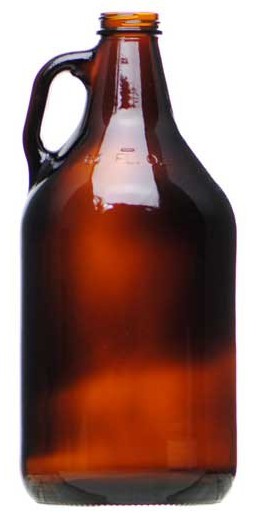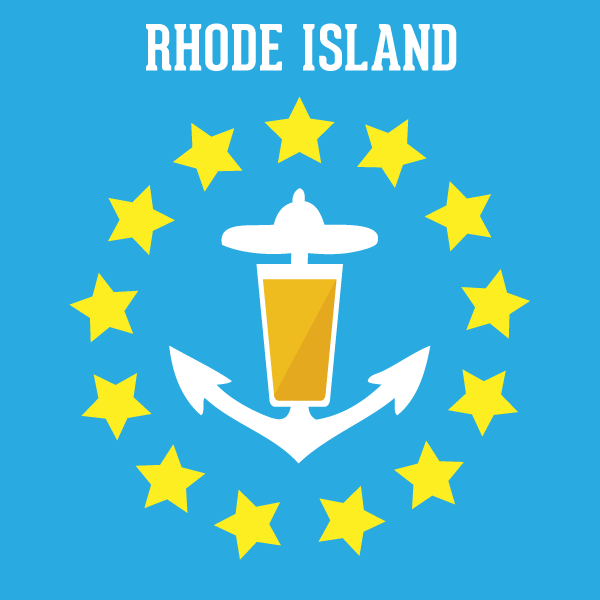 Freedom of choice / Is what you want
Freedom of choice / Is what you want
_Devo
You can’t always get what you want
_The Rolling Stones
On October 30, 2014, two days after the launch of this enterprise, we received our first email, which included a question about growlers. In February, when we introduced the “Ask Bottles & Cans” series, five questions concerned growlers — and frustration over the 72-ounce limit was cited in most of them.
Why the 72-ounce cap? Let’s turn back the clock a bit…
On July 16, 2013, Governor Lincoln Chafee signed S 0236 Substitute A, “An Act Relating to Alcoholic Beverages — Manufacturing and Wholesale Licenses,” which allowed breweries and distilleries to “provide to visitors in conjunction with a tour and/or tasting, samples, clearly marked as samples, not to exceed 375 ml per visitor for distilled spirits and 72 ounces per visitor for malt beverages at the licensed plant by the manufacturer of the product of the licensed plant to visitors for off-premise consumption.”
Translation: Rhode Island breweries [Bucket, Foolproof, Grey Sail, Newport Storm, and Ravenous when the bill was passed, since joined by Proclamation, Whaler’s, Crooked Current, and Tilted Barn; Revival and Narragansett don’t have their own shops] could finally “sell” beer at their facilities and you could take it home [or wherever] and enjoy it. The “72 ounces per visitor” equals a six-pack, three 22-ounce bombers, a conventional 64-ounce growler, or two growlettes/howlers [or a combination of those formats]. The “sale” of the “sample” would be allowed as part of a tasting and/or tour.
It was a long-sought and hard-fought victory. The battle began around 2006 when Newport Storm — then the state’s lone brewery — started the push to legalize growler sales. The proposal was met with firm resistance from wholesalers [and their lobbyists], who touted the venerable merits of the established alcohol distribution system. After years of frustration, the fledgling breweries joined the cause and the beer-to-go “clearly marked as samples” law got the green light.
Even the smallest change is a large accomplishment. Liquor laws are a hornet’s nest, a can of worms, a confounding tangle of red tape — choose your metaphor. All 50 states have different sets of rules and regulations and restrictions — and some of those three Rs differ in a given state’s cities and towns. Many of the laws have been on the books since the repeal of Prohibition and the establishment of the three-tier system of alcohol distribution in 1933. But eight decades later, the proliferation of small brewers and consumers’ passion for supporting local beer and businesses means its time to make significant updates to the established alcohol distribution system.
• • •

Rhode Islanders’ aversion to traveling “long distances” is well-known. Local beer lovers would be much more likely to make the round trip from Warwick [80 miles] or Woonsocket [114 miles!!] to get fresh beer at Grey Sail in Westerly if they could purchase more than one growler. With beer tourism on the rise, the limit will discourage visitors to “Discover Beautiful Rhode Island,” as the signs urge drivers at the state’s borders, and encourage informed travelers to head to breweries in Massachusetts and/or Connecticut. There is no limit to the number of growlers you can purchase in the Bay State [though breweries must fill their “own” growlers, emblazoned with their branding; in RI, some brewers will only fill their own glassware; call ahead!]; in Connecticut, customers can buy 288 ounces per visit — aka, four growlers [and one quart].
The 72-ounce limit at breweries is even more irksome since there is no limit on the number of growlers that can be purchased at brewpubs [and you can buy multiple cases of wine at local vineyards]. And there is no limit on the number of pre-filled growlers [from Bucket, Berkshire Brewing, and other area companies] that can be bought at stores. That playing field needs to be leveled!
There is a lot of potential upside to lifting the restriction: it would boost sales [um, duh] which would lead to increased production — and more jobs! Win-win-win! Readers also mused that an increase in growler sales would boost the state’s sales tax, but that’s not the case. S 0236 authorized breweries to “sample” growlers — but by law they are selling the tour and/or tasting, not the beer. Because they are selling a service, there is no sales tax [though there is a tax paid for the glassware — it’s always something]. OK, add a tax fix to that ounces amendment!
• • •
Given the struggle that finally yielded the 72-ounce “compromise,” as one brewer called it, there is some resistance to fighting that battle all over again with the wholesalers and retailers — and their lobbyists. Another brewer said: “It was a [long] fight to get the 72 ounces, and a big concern that we had to overcome was that if we were allowed that much, we’d start looking for more. It is frustrating that just about any other business can manufacture and sell their product, while alcohol producers need to do business with one hand tied behind our backs.” And presently, the state’s breweries are at distinct tiers, vis-à-vis on-site vs. wholesale purchases: the more established beermakers — Newport Storm, Foolproof, Grey Sail, Bucket — have a growing foothold in the marketplace, while the nanos and micros could see significant gains with increased in-house sales.
It’s a tricky balancing act for all concerned. Six of the locals [Bucket, Foolproof, Grey Sail, Newport Storm, Proclamation, and Revival; the latter enjoys unlimited growler sales through its partnership with the Brutopia brewpub] are sold in stores — and distributed by the tier of the industry that fought the growler law. All of the breweries [except Tilted Barn, for now] are available in bars. But with the dramatic rise of craft’s share of the market, finding a way to share the increasing revenue should be mutually beneficial at all the levels of the three-tier system.
• • •
 We’re sure there were some legislative struggles in our neighboring states, but we’re hoping that the old saw about a rising tide lifting all boats can be embraced by the lobbyists and that the potential for increased sales at local breweries isn’t seen as a threat to sales at liquor stores.
We’re sure there were some legislative struggles in our neighboring states, but we’re hoping that the old saw about a rising tide lifting all boats can be embraced by the lobbyists and that the potential for increased sales at local breweries isn’t seen as a threat to sales at liquor stores.
We reached out to some folks who know how the sausage gets made at the State House for some advice on how to start pushing for change:
• Nothing will happen before 2016 when new legislation can be submitted to the House and Senate [S 0236 Substitute A was introduced on 2.6.13, passed the Senate in April, and was signed in July], but the campaign for better beer laws needs to start in the fall.

• The crux of the matter is that beer is a business, and changing the laws will be good for the economic growth of a small but thriving local industry. Contact your lawmakers [especially those who represent the breweries’ home cities and towns] and express your support for the state’s hard-working and ambitious beermakers. [S 0236 Substitute A was introduced by Senators Louis P. DiPalma, M. Teresa Paiva Weed, Dennis L. Algiere, Erin P. Lynch, and Dominick J. Ruggerio; they can be reached at sen-dipalma@rilin.state.ri.us; sen-paivaweed@rilin.state.ri.us; sen-algiere@rilin.state.ri.us; sen-lynch@rilin.state.ri.us; sen-ruggerio@rilin.state.ri.us].
• The brewers need to do a PR campaign. The first step should be the long-overdue launch of a RI Beer Trail/Brewery Challenge/Passport project, modeled on the programs in Massachusetts and Vermont. It’s simple and fun: participants get a T-shirt [or other promotional swag] when their passport is stamped by all of the breweries and brewpubs on the Biggest Little map. It’s a simple and very interactive way to promote the profile of RI beer in-state and beyond. A subsequent campaign trumpeting the benefit of increased sales and jobs would raise awareness and support the cause.
• Local brewers need their own lobbyist to make the case that outdated laws are restricting business and potential job growth. Working the corridors of power at the State House is another playing field that needs to be leveled.
But the wheels turn slowly everywhere. Here’s a prime example: in April, after three years [and more than $1 million of lobbyist to-ing-and-fro-ing], Florida passed a bill that allowed sales of industry-standard 64-ounce growlers — changing the law that had limited sales to quart and gallon [!] containers. Governor Rick Scott’s comment should be espoused as an inspirational rallying cry for all of these proposals: “By making the sale of 64-ounce growlers legal in Florida, we are eliminating another burdensome regulation and allowing more Florida businesses to succeed. We are pleased to create a world-class business environment where all businesses, including breweries, can succeed.” Huzzah! We’ll drink to that!
• • •
Beyond growlers, another key legislative focus is on approving tap room status for breweries, like they have in [wait for it…] Massachusetts and Connecticut. S 0236 specifies that the manufacturer’s license “does not authorize the sale of beverages for consumption on premises.” In Connecticut, a Manufacturer Permit allows growler sales, while a coveted Manufacturer for Beer and Brewpub license adds pint sales in the tasting room. So we’ll need yet another law to enhance the brewery experience — and boost the aforementioned beer tourism. Win-win!
• • •

And while we’re shaking things up, let’s add another spoke to the better beer wheel and make the case for growler sales of local and national accounts at retail locations. Thirty-five or so states fill glassware at grocery and convenience stores, gas stations, and liquor stores. We recently visited a package store in upstate NY whose dozen taps were pouring the likes of Jack’s Abby’s Hoponius Union, Evil Twin’s Imperial Doughnut Break, and Goose Island’s Bourbon County Brand Stout in your choice of container — 64-, 32, or 16-ounce [a growler of BCBS was $37.99; that’s not a typo]. Consumers would love that option here, and retailers would benefit from adding the draft format — but bar owners would likely frown on the addition [though in PA and other states you can buy growlers-to-go at taverns]. [When Bottles in Providence opened they had a growler station, but it was quickly removed as it was in violation of a state law and/or health code.] Maybe we can add this to the 2017 legislative calendar…
• • •
Is any state a true brewtopia — with growlers available at breweries and retail and taverns? With a more-options-are-better mindset? With a why-can’t-we-all-get-along? attitude? Nah, it’s always something. But we hope that Rhode Island will make strides to help small breweries thrive, to have more choices at stores, and to motivate a beer lover in Woonsocket to drive allll the way to Westerly — and to explore and enjoy our many other hoppy stops in between.
Mega-thanks to everyone — at all the levels of the three-tier system — who provided data, guidance, advice, and feedback. Please add your input in the Comment section!

Nice job, good summation….
LikeLike
My thoughts exactly. Lift the limit, allow the tap rooms. My fear is that RI can’t get out of it’s own way with these kinds of things. Wholesalers and retailers have too much power here. They’ve got politicians in their pockets. Here’s to hoping things could change next year though!
LikeLike
Enjoyed the article, thanks.
LikeLike
There are only two distributing companies in RI who have (and can afford) lobbyists. Not all of us are alike. Hopefully, the unity RI Breweries have will bring about the change in legislation desired to positively impact the industry and the bigger picture, economy.
LikeLike
Needed to be said! Great article.
LikeLike
This is great. Going to forward the link to my congressman.
LikeLike
RI is the FU I got mine state.
I hope we can go beyond fighting over the pie and move into growing the pie so all can enjoy.
LikeLike
the efforts to legalize growlers in CT took place in 2005. Before that no beer to go was allowed anywhere. Weve come a long way baby! There was some opposition from the distributor lobby and MADD early one. We gave the distributors a piece by not allowing growlers to be sold beyond the same hours that package stores were open. Maybe that is an offer that can be made in RI too? I wish the breweries in RI luck with this effort. There are good suggestions in the column about mobilizing and PR efforts. A champion legislator is another good piece to find as they will know the inside objections and who to appease to get the oz cap increased.
Good luck!
LikeLike